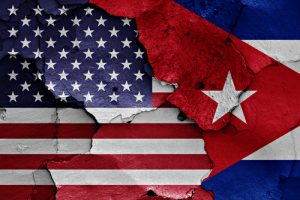
A number of House Republicans raised concerns about national security, economic growth and human rights on Friday after President Donald Trump announced new business and travel restrictions on Cuba.
U.S. Reps. Tom Emmer (R-MN), Ted Poe (R-TX) and Rick Crawford (R-AK), members of the bipartisan Cuba Working Group, were among the lawmakers who voiced opposition to a directive signed by Trump that limits commerce with the business wing of Cuba’s military and subjects non-Cuban American travelers to Treasury Department audits.
Trump’s change in U.S. policy toward Cuba reverses aspects of the Obama administration’s easing of sanctions against the island in recent years.
Emmer said he was extremely disappointed in Trump’s announcement, noting that the president’s signing of the directive would bring the United States no closer to addressing human rights issues in Cuba.
“With (Friday’s) directive, the administration is limiting our opportunities to improve the human rights and religious liberties of the Cuban people, not expanding them,” Emmer said. “This policy decision will hurt the United States economically, making it harder for our nation’s farmers to access new markets and cutting the knees out from under our travel and manufacturing industries.”
Perhaps most importantly, Emmer said, Friday’s announcement “creates a very real security risk for the American people and our homeland by inviting foreign nations into our backyard to fill a void that today’s announcement is creating.” He added that he would continue to work with his House colleagues to support human rights, religious freedoms and a secure hemisphere that brings new economic opportunities to Americans.
Crawford said Trump’s decision would reinstate an outdated and isolationist posture towards Cuba and would open the door for other countries to engage with Cuba.
“This policy change is not just a missed opportunity for rural America, which would greatly benefit from increased access to the island’s $2 billion agricultural imports market,” Crawford said. “This policy shift also poses an unjustifiable risk to our national security, as further U.S. disengagement opens up opportunities for countries like Iran, Russia, North Korea and China to gain influence on an island 90 miles off our coast.”
Finally, Crawford said restricting travel and trade and limiting the ability to share American democracy “will hinder efforts to improve human rights and religious liberties in Cuba.”
Poe, meanwhile, said Trump’s announcement sets the United States back to “the failed policies of the past.” However, he added that he found it reassuring the U.S. Embassy in Havana would remain open, and that American airlines would be able to continue direct flights to Cuba.
Friday’s changes “will certainly hurt American farmers and job producers,” Poe said. “By prohibiting individual educational trips and American companies from engaging with Cuban government entities, we are stifling potential economic growth and restricting the spread of American values.”
If the United States prohibited conducting business with nations that had troubling human rights records, Poe said, the nation would lose many of its trading partners.
“The new policy changes do not punish Cuba, they hurt Americans, American enterprise and American values,” said Poe.



